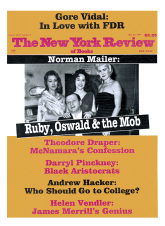In response to:
Mysteries of Mallarmé from the September 22, 1994 issue
To the Editors:
P.N. Furbank, in his review [NYR, September 22, 1994] of Gordon Millan’s biography of Mallarmé, charges me with foisting my own metaphysics on the poet’s oeuvre. But the ideas were unequivocally his: for example, he announced (in his lectures at Oxford and Cambridge in 1894) the core structure of the future Great Work as “the symphonic equation proper to the seasons.” Other than pointing out the widespread occurrence of this four-polar “equation” (at times labelled precisely as such, e.g. in the jottings called Le Livre), and commenting on it, all I did was dub it “tetrapolarity.”
Now Michel Deguy, who is France’s leading poet and the one deemed closest to Mallarmé but also, surprisingly, the President of the Collége international de philosophie, not only totally “buys” the concept, including the terminology, and declares that without it one cannot penetrate into Mallarmé’s universe, but he gives a list of prominent critics who have been left behind in this respect. Guy Michaud states, in his major work on the poet, that our understanding of him has to be “entirely revised” because of the new revelations.
A simple but pregnant question: can one imagine Frenchmen of this cailber—throw in Sartre, Blanchot, Barthes, Poulet, Foucault, Kristeva, Richard, who offer overwhelming testimony of the groundbreaking nature of Mallarméan epistemology, as against the incredible pitch Furbank makes for a purely non-ideational reading of him—can one imagine, I repeat (still stunned at the enormity of the proposition) those elite French minds “buying” the theses of an obscure American, if they were as empty, arbitrary, even wacky, as Mr. Furbank indisputably and recklessly declares? Why did the whole Tel Quel group go for them or even, as has been authoritatively suggested, the entire French avant-garde? Plus Guy Rosolato, Jean Cassou, Ungaretti, Hermann Broch…Mondor himself wrote that these ideas were “essential.” Georges Poulet remarked that they explained Igitur.
But if the reader takes the word of someone who has done no more than read Mallarmé over that of a person who has spent sixty years on him (nine books in print) and been called more than once Mallarmé’s prolongation (“Mallarmé posthume,” Deguy), well it just offers more evidence of why smart young people are apt to go into science.
Robert Greer Cohn
Professor Emeritus of French
Stanford University
Stanford, California
This Issue
May 11, 1995



